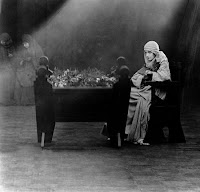Global Guerillas
 Setbacks in the war on terror don’t only flow from the mistakes of individual leaders and generals. They’re structural. It’s pointless to decapitate the head of the insurgency or disrupt its command structure, because the insurgency doesn’t have these things. Instead, it is a swarm of disparate companies that share information, learn from each other’s experiments and respond quickly to environmental signals. Democratic nations need to build their own decentralized counterinsurgency networks.
Setbacks in the war on terror don’t only flow from the mistakes of individual leaders and generals. They’re structural. It’s pointless to decapitate the head of the insurgency or disrupt its command structure, because the insurgency doesn’t have these things. Instead, it is a swarm of disparate companies that share information, learn from each other’s experiments and respond quickly to environmental signals. Democratic nations need to build their own decentralized counterinsurgency networks.Look on the Global Guerillas blog of John Robb. And read this op-ed of David Brooks in today's NYT:
May 18, 2007
Op-Ed Columnist
The Insurgent Advantage
By DAVID BROOKS
The war on terror has shredded the reputation of the Bush administration. It’s destroyed the reputation of Tony Blair’s government in Britain, Ehud Olmert’s government in Israel and Nuri al-Maliki’s government in Iraq. And here’s a prediction: It will destroy future American administrations, and future Israeli, European and world governments as well.
That’s because setbacks in the war on terror don’t only flow from the mistakes of individual leaders and generals. They’re structural. Thanks to a series of organizational technological innovations, guerrilla insurgencies are increasingly able to take on and defeat nation-states.
Over the past few years, John Robb has been dissecting the behavior of these groups on his blog, Global Guerrillas. Robb is a graduate of the Air Force Academy and Yale University, and he has worked both as a special ops counterterrorism officer and as a successful software executive.
In other words, he’s had personal experience both with modern warfare and the sort of information management that is the key to winning it. He’s collected his thoughts in a fast, thought-sparking book, “Brave New War” that, astonishingly, has received only one print review — distributed by U.P.I. — in the month since it’s been published.
Robb observes that today’s extremist organizations are not like the P.L.O. under Yasir Arafat. They’re not liberation armies. Instead, modern terror groups are open-source, decentralized conglomerations of small, quasi-independent groups.
There are between 70 and 100 groups that make up the Iraqi insurgency, and they are organized, Robb says, like a bazaar. It’s pointless to decapitate the head of the insurgency or disrupt its command structure, because the insurgency doesn’t have these things. Instead, it is a swarm of disparate companies that share information, learn from each other’s experiments and respond quickly to environmental signals.
For example, the U.S. has spent billions trying to disrupt attacks from improvised explosive devices, but the I.E.D. manufacturing stream has transmogrified and now includes sophisticated metallurgy, outsourcing and fast innovation cycles. The number of I.E.D. attacks has remained pretty constant throughout the war.
Superempowered global guerrillas — whether it’s Al Qaeda, Iraqi insurgents, Nigerian oil fighters or the Brazilian gang P.C.C. — specialize in what Robb calls systems disruption. They attack the networks that support modern life. In one case, Iraqi insurgents spent roughly $2,000 to blow up an oil pipeline in Southeast Iraq. It cost the Iraqi government $500 million in lost revenue. For the insurgents, that was a return on investment of 25 million percent.
The 9/11 attacks, the Madrid bombings, the Niger Delta oil well attacks and even the Samarra mosque bombing were all attempts to disrupt the economic and social systems of target nations.
But, Robb continues, these new groups are not seeking to take over their countries the way 20th-century guerrillas did. They have a prenational, feudal mind-set to go along with their postnational Silicon Valley-style organizational methods. They merely seek to weaken states, so they can prosper in the lawless space created by collapse of law and order. That way the groups don’t have to construct anything or assume responsibility for anything.
In fact they’ve learned, as Lawrence of Arabia learned decades ago, that it’s better to weaken target governments, but not actually destroy them. When nations don’t feel existentially threatened, they don’t mobilize all their resources to defeat their foes. They try to fight wars on the cheap, and end up in a feckless semibelligerent state somewhere between real war and nonwar.
Robb is pessimistic (excessively so) that top-heavy, pork-driven institutions like the Defense Department or the Department of Homeland Security can ever keep up with open-source insurgencies. Since 9/11, he believes, big government institutions have engaged in a process of hindsight re-engineering designed to reduce future risk, when in fact, the very nature of the threat is that it’s random and cannot be anticipated.
He thinks democratic nations need to build their own decentralized counterinsurgency networks, though he goes over the top in imagining local squads of grass-roots terror fighters.
But time and again, he hints at the core issue, which is that nation-states are inefficient learning organizations, at least compared to their feudal and postnational foes. If the Iraqi insurgents defeat the U.S. then every bad guy on earth will study and learn their techniques. The people now running for president will find themselves in bigger heaps of trouble than the current one now is — trouble that this presidential campaign hasn’t even dealt with.



